MARKET OVERVIEW
In the pursuit of enhancing the well-being of individuals grappling with social anxiety, the Social Anxiety Treatment market for treatments has become a dynamic arena where innovative strategies and interventions are continually shaping the therapeutic landscape. The Social Anxiety Treatment market addresses the multifaceted challenges posed by social anxiety disorder, a condition that extends beyond mere shyness to a profound and often debilitating fear of social interactions. Unlike generic approaches, interventions within this market are finely tailored to address the unique nuances of social anxiety, recognizing it as a complex interplay of psychological, social, and environmental factors.
Psychotherapeutic modalities form a cornerstone of the Social Anxiety Treatment market, offering individuals a platform to explore, understand, and navigate the intricacies of their anxiety. Cognitive-behavioral therapy (CBT), exposure therapy, and acceptance and commitment therapy (ACT) are among the therapeutic approaches gaining prominence, fostering resilience and empowering individuals to confront and overcome social fears.
Pharmacological interventions, another vital facet of the market, involve the use of medications to alleviate the symptoms associated with social anxiety. Antidepressants and anti-anxiety medications, carefully prescribed and monitored, play a pivotal role in restoring a sense of balance and functionality to individuals experiencing the profound impact of social anxiety.
In addition to traditional therapeutic modalities, the Social Anxiety Treatment market is witnessing a surge in technology-driven interventions. Virtual reality exposure therapy, for instance, provides a controlled and immersive environment for individuals to confront and manage social situations, offering a novel avenue for therapeutic engagement.
Moreover, the market is attuned to the importance of holistic well-being, recognizing that social anxiety is not confined to the mind alone. Lifestyle interventions, including stress management techniques, exercise regimens, and nutritional support, are emerging as integral components of a comprehensive approach to addressing social anxiety.
As the Social Anxiety Treatment market continues to evolve, it reflects a commitment to personalized and patient-centric care. The emphasis is on tailoring interventions to the unique needs of individuals, acknowledging that the journey to overcoming social anxiety is highly individualized. This bespoke approach extends beyond a one-size-fits-all paradigm, fostering a therapeutic environment that is nuanced, empathetic, and attuned to the diverse manifestations of social anxiety.
The Social Anxiety Treatment market stands as a testament to the advancements in mental health care, offering a rich tapestry of interventions that extend beyond conventional boundaries. By weaving together psychotherapeutic modalities, pharmacological interventions, and cutting-edge technologies, the market envisions a future where individuals grappling with social anxiety find solace, resilience, and the tools to navigate the complexities of social interactions with confidence and authenticity.
Global Social Anxiety Treatment market is estimated to reach $16,104.2 Million by 2030; growing at a CAGR of 3.9% from 2023 to 2030.
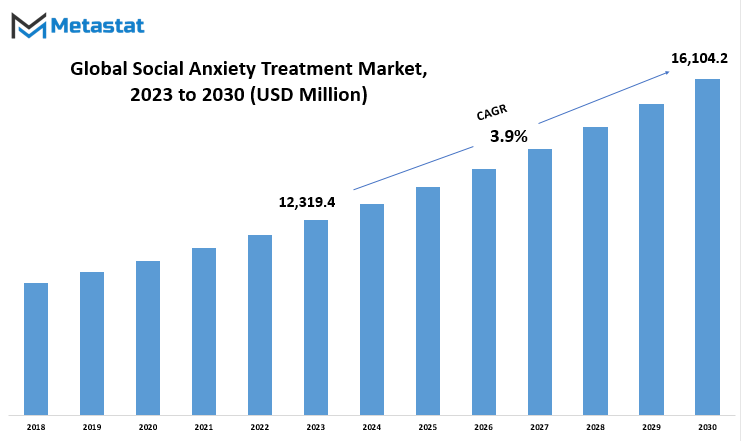
GROWTH FACTORS
The Global Social Anxiety Treatment market witness's significant growth, primarily fueled by various key driving factors. These factors play a pivotal role in shaping the market landscape. On the flip side, certain challenges may impede the growth trajectory. Yet, amid these challenges, promising opportunities emerge, indicating a potential upswing for the market in the foreseeable future.
One of the primary drivers is the increasing awareness and recognition of social anxiety disorders. As societies become more attuned to mental health concerns, there's a growing acknowledgment of social anxiety as a legitimate condition that warrants attention and treatment. This heightened awareness not only reduces the stigma associated with mental health but also encourages individuals to seek professional help, boosting the demand for social anxiety treatment.
Moreover, advancements in medical research and technology contribute significantly to market growth. As our understanding of the underlying causes and mechanisms of social anxiety deepens, innovative treatment modalities and interventions come to the forefront. This translates into a more diverse and effective range of treatment options, catering to the varying needs of individuals grappling with social anxiety.
However, the market isn't without its challenges. Factors such as economic uncertainties and limited accessibility to mental health services can act as stumbling blocks. Economic downturns may affect individuals' ability to afford treatment, creating a barrier to entry for some. Additionally, disparities in access to mental health resources, particularly in underserved regions, pose challenges in reaching a broader demographic.
Emerging trends, like the integration of technology in mental health services, open new avenues. Telehealth solutions and digital platforms enable remote access to treatment, addressing geographical constraints and enhancing overall accessibility. This not only aligns with the current trend of digitization in healthcare but also taps into the evolving preferences of individuals seeking convenient and flexible solutions.
The Global Social Anxiety Treatment market is on a growth trajectory driven by heightened awareness, advancements in research and technology, and innovative treatment approaches. While challenges exist, such as economic uncertainties and accessibility issues, the market's resilience is underscored by the emergence of opportunities, particularly in the realm of technology integration. As the landscape continues to evolve, the market is poised to navigate challenges and capitalize on avenues for sustainable growth in the coming years.
MARKET SEGMENTATION
By Treatment Type
Within the expansive landscape of the global Social Anxiety Treatment market, the spectrum of treatment options reveals a nuanced approach to addressing this prevalent concern. These treatments, each playing a distinctive role, collectively contribute to the diverse arsenal available to patients and healthcare providers.
Cognitive-behavioral Therapy (CBT), a cornerstone in the treatment repertoire, stood at the forefront, valued at 1818.8 USD Million in 2022. This form of therapy delves into the intricate interplay between thoughts, emotions, and behaviors. By fostering awareness and providing practical tools, CBT empowers individuals to manage and overcome the challenges posed by social anxiety.
Complementing CBT is Exposure Therapy, a segment valued at 1936.9 USD Million in the same period. This approach gradually exposes individuals to feared social situations, allowing them to confront and navigate these scenarios in a controlled and supportive environment. Exposure Therapy is designed to diminish the overwhelming anxiety associated with social interactions, enabling individuals to build resilience over time.
In tandem with therapeutic interventions, the market encompasses the significant realm of Drug Medication and Devices, commanding a substantial value of 7137.9 USD Million in 2022. Medications and devices contribute to a holistic treatment approach, addressing physiological aspects of social anxiety. From anxiolytic medications to innovative devices facilitating biofeedback, this segment reflects the ongoing efforts to provide a comprehensive and tailored treatment experience.
Beyond these primary categories, the market acknowledges the existence of Other treatment modalities, valued at 995.5 USD Million in 2022. This category encapsulates a variety of interventions, ranging from alternative therapies to emerging treatment approaches. The diversity within the "Others" segment mirrors the acknowledgment that individuals respond uniquely to different therapeutic strategies, necessitating a flexible and personalized treatment approach.
The global Social Anxiety Treatment market mirrors the multifaceted nature of social anxiety itself. The array of treatment options, from well-established cognitive-behavioral therapies to innovative approaches like exposure therapy, collectively speaks to the commitment to providing diverse solutions. The integration of drug medication and devices further underscores the comprehensive nature of addressing social anxiety from both psychological and physiological perspectives. The inclusion of others acknowledges the ongoing exploration and adaptation of new strategies to meet the unique needs of individuals grappling with social anxiety. In this way, the market reflects a dynamic and responsive landscape, committed to enhancing the quality of life for those affected by social anxiety.
By Application
In the expansive landscape of the global Social Anxiety Treatment market, applications serve as pivotal indicators of the diverse conditions it addresses. The market, in its pursuit of ameliorating mental health, delineates its offerings based on distinct applications. These applications resonate with various mental health challenges, tailoring treatments to specific needs.
Major Depressive Disorder (MDD), a prevalent mental health concern, stands out as a key application in this market. As one of the leading causes of disability worldwide, MDD necessitates targeted treatments to alleviate the debilitating symptoms associated with persistent depressive feelings.
Obsessive-Compulsive Disorder (OCD) marks another significant facet of the market. Recognized for its intrusive thoughts and repetitive behaviors, OCD requires nuanced treatments to mitigate its impact on individuals' daily lives. The market's focus on OCD underscores the importance of tailored approaches in addressing specific anxiety disorders.
Phobias, encompassing a range of irrational fears, constitute a substantial application within the Social Anxiety Treatment market. By offering specialized interventions for various phobias, the market addresses the unique challenges presented by these anxiety-inducing conditions, promoting a more comprehensive approach to mental health care.
Beyond these primary applications, the market extends its reach to encompass other anxiety-related disorders. This inclusivity reflects the versatility of treatments offered, recognizing that anxiety manifests in diverse ways across individuals.
The Social Anxiety Treatment market, through its diverse applications, mirrors the nuanced landscape of mental health. It acknowledges that a one-size-fits-all approach is inadequate in the realm of mental health treatment. By tailoring interventions to specific applications such as MDD, OCD, phobias, and others, the market navigates the intricate terrain of anxiety disorders, offering targeted and effective solutions for individuals grappling with various facets of social anxiety.
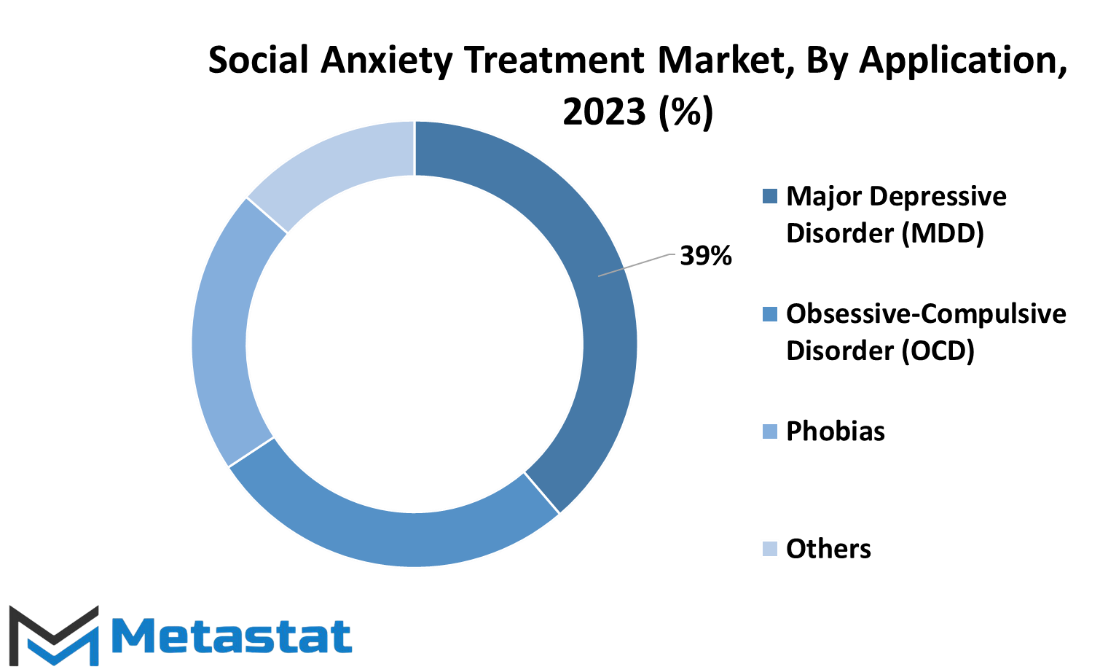
REGIONAL ANALYSIS
The global Social Anxiety Treatment market operates on a global scale, catering to a diverse range of individuals grappling with social anxiety. In essence, this market, like any other, is not confined to a specific locality but spans across borders, reflecting the universal nature of social anxiety as a mental health concern.
This expansive market is characterized by its global reach, recognizing that social anxiety is not limited by geographical boundaries. Its impact is felt globally, prompting the need for treatments and interventions that resonate with people from different cultures and backgrounds.
Within this market, various treatment options exist to address the pervasive issue of social anxiety. These treatments are not constrained by specific regions but are accessible to individuals worldwide. The market's global nature ensures that people facing social anxiety can avail themselves of a spectrum of treatment approaches, irrespective of their location.
The dynamics of the global Social Anxiety Treatment market underscore the shared experiences of individuals dealing with social anxiety across the world. It reflects a collective effort to provide effective solutions that are universally applicable, acknowledging the widespread prevalence of social anxiety as a mental health challenge.
The global Social Anxiety Treatment market transcends geographical confines, recognizing the global nature of social anxiety. This market endeavors to provide accessible and effective treatments on a worldwide scale, acknowledging the shared experiences of individuals dealing with social anxiety globally.
COMPETITIVE PLAYERS
The global Social Anxiety Treatment market, several key players have emerged, each contributing to the dynamic landscape of mental health solutions. Notable among them are BetterHelp and Eli Lilly and Company. BetterHelp stands out as a prominent player, offering a platform that connects individuals with licensed therapists online. In an era where accessibility to mental health support is paramount, BetterHelp provides a convenient and digital avenue for those seeking treatment for social anxiety. Through its online counseling services, BetterHelp has carved a niche in the market, addressing the evolving needs of individuals navigating the complexities of social anxiety.
Eli Lilly and Company, a pharmaceutical giant, also plays a significant role in the Social Anxiety Treatment market. With a focus on research and development, Eli Lilly and Company have been instrumental in producing medications that address mental health disorders, including social anxiety. Their commitment to providing effective pharmaceutical solutions underscores the multifaceted approach required in tackling social anxiety on a global scale.
The involvement of such key players reflects the growing recognition of mental health treatment's importance, particularly in social anxiety. The synergy between digital platforms like BetterHelp and pharmaceutical innovators like Eli Lilly and Company illustrates a comprehensive approach to addressing the diverse needs of individuals grappling with social anxiety.
These key players not only contribute to the market’s growth but also embody a broader societal shift towards acknowledging and treating mental health issues. BetterHelp’s online counseling services and Eli Lilly and Company’s pharmaceutical advancements collectively shape the landscape of the Social Anxiety Treatment market, offering hope and support to individuals worldwide seeking effective solutions for their mental well-being.
Social Anxiety Treatment Market Key Segments:
By Treatment Type
- Cognitive-behavioral Therapy (CBT)
- Exposure Therapy
- Drug Medication and Devices
- Others
By Application
- Major Depressive Disorder (MDD)
- Obsessive-Compulsive Disorder (OCD)
- Phobias
- Others
Key Global Social Anxiety Treatment Industry Players
- BetterHelp
- Eli Lilly and Company
- AbbVie Inc.
- GlaxoSmithKline PLC
- Johnson & Johnson
- Lundbeck A/S
- Organon & Co.
- Mindstrong Health
- Otsuka Pharmaceutical
- Pfizer Inc.
- Bausch Health Companies Inc.
- Spring Health
- Talkspace
- Teva Pharmaceutical Industries Ltd.
- Viatris Inc.
WHAT REPORT PROVIDES
- Full in-depth analysis of the parent Industry
- Important changes in market and its dynamics
- Segmentation details of the market
- Former, on-going, and projected market analysis in terms of volume and value
- Assessment of niche industry developments
- Market share analysis
- Key strategies of major players
- Emerging segments and regional growth potential



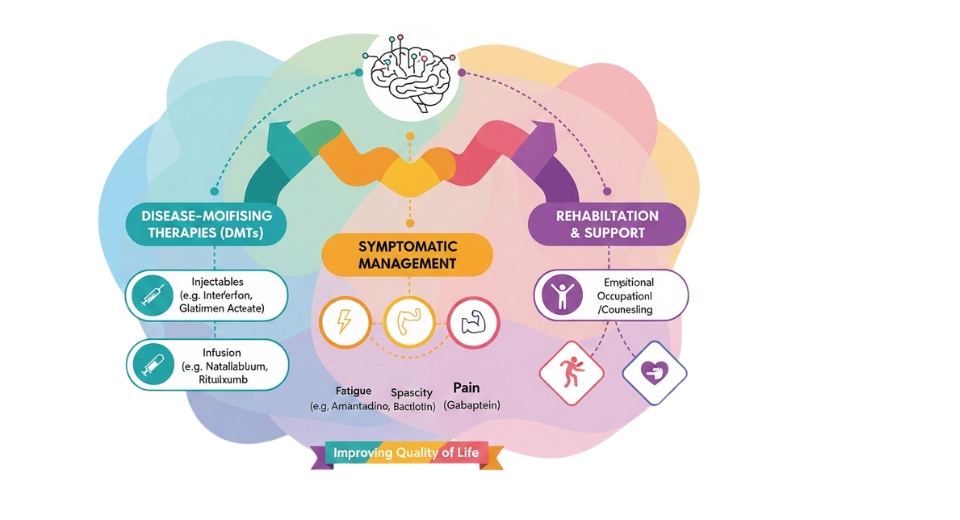
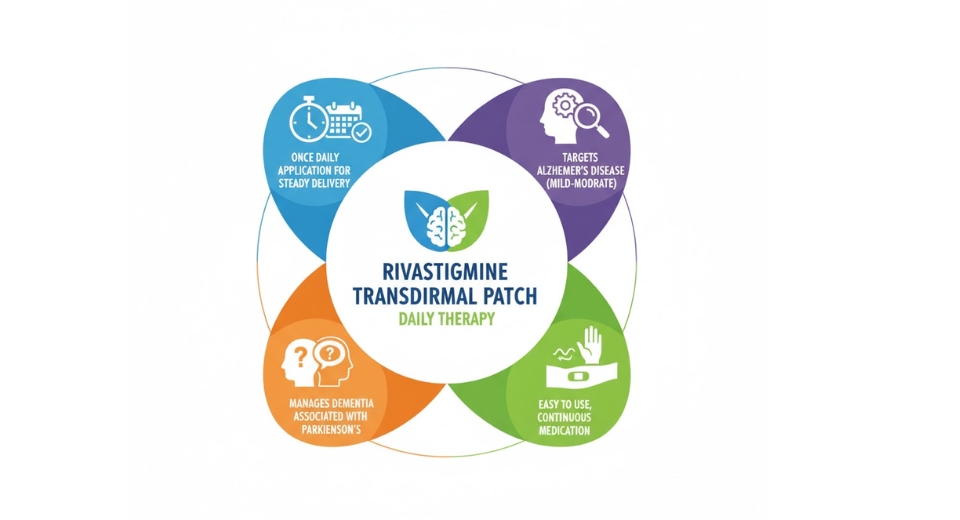
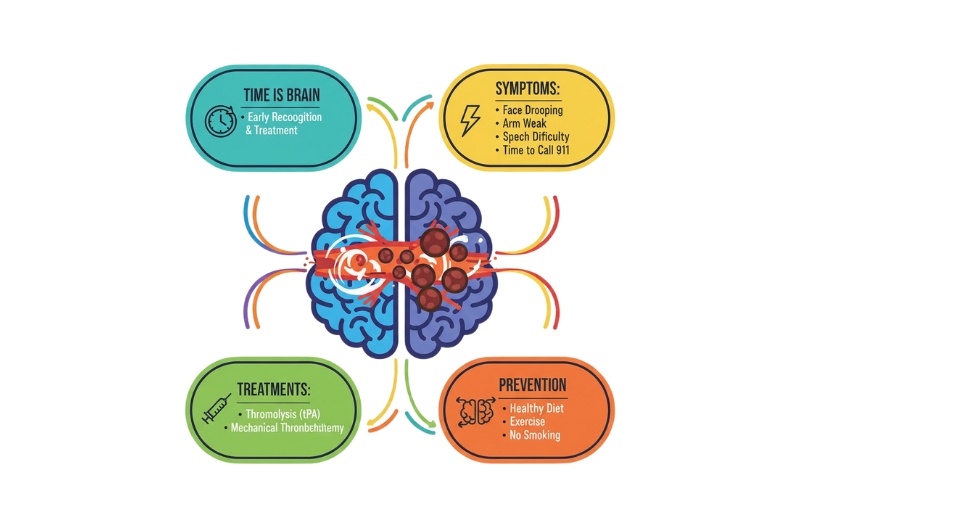
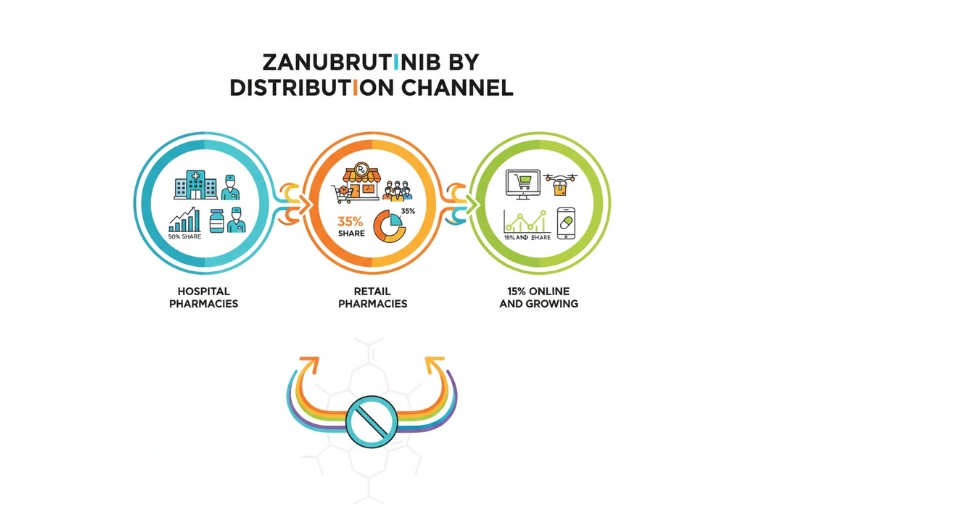

 US: +1 3023308252
US: +1 3023308252






